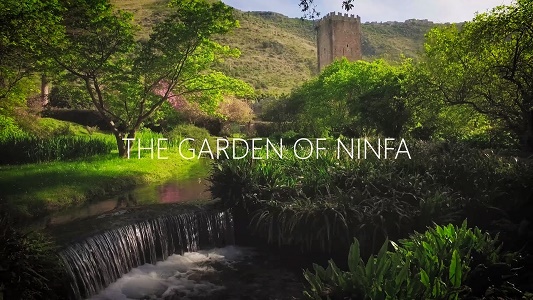Italy: The Garden of Ninfa, the legendary Garden built by a princess

Rome: An hour and twenty minutes from Rome, in Cisterna di Latina, on the border between picturesque Norma and Sermoneta, there is a garden that stands out for its uniqueness and beauty.
Romantic and charming in character, the Garden of Ninfa stands on the remains of the medieval town of the same name, stretching over eight hectares, where parts of the castle, the walls, and remains of churches dot the landscape.
But the greatness of the present naturalistic Oasis is mainly due to Lelia Caetani, the last descendant of the Caetani family. It was she, in fact, who completed the project of the current garden that did not respond to any model, or fashion of the times, but simply to the creative instinct and the ability of the three women of the House.
The city of Ninfa (whose name seems to derive from a small temple of classical age on a small island of the lake, dedicated to the Nymphs), has its origins in Roman times, in the form of a small agricultural center.
During the middle of the eighth century, Ninfa became a small, yet bustling urban center with houses and churches, thanks to the movement of trade on the foothills, passing near the town.
Throughout the Midddle Ages, Ninfa changed owners a few times, always belonging to the Roman nobility, but in 1300 the town was sacked and destroyed, razed to the ground. Ninfa was not to be rebuilt and the few huts that resisted belonged to the peasants who worked the surrounding countryside. With the passing of time, the encroachment of the swamp and malaria forced the few remaining residents to move and abandon Ninfa.
The history of the garden itself begins in 1921, when Italian nobleman and diplomat Gelasio Caetani initiated the reclamation of the area to make it a summer residence.
He restored some ruins, including the tower and the town hall, and started on the garden, planting botanical species that he recovered abroad during his travels. Helped by his mother, Ada Wilbraham, who had botanical knowledge, he laid the foundations for a garden that, thanks to the favorable microclimate of Ninfa, developed wonderfully. In fact, the climate proved to be ideal for the flourishing development of the garden, thanks to the high humidity guaranteed by the Ninfa river and by the Norma cliff, which stopped the passage of lower clouds causing frequent rains.
Construction of the garden continued with Roffredo Caetani, his wife Marguerite Chapin and their daughter Lelia Caetani. Lelia Caetani, who had no heirs and was the last representative of the family, made sure to create a foundation, the Roffredo Caetani di Sermoneta foundation, to which she gifetd the castle of Sermoneta and the garden. Still today, the same foundation takes care of the management of the park.
It was Princess Lelia Caetani and her mother Marguerite who gave the park its current layout, creating a romantic English garden, which today seems anything but built: the plants have adapted perfectly and everything gives the idea of natural growth.
Two characteristics of the English garden are the inclusion of fake elements and ancient remains- in Ninfa there are authentic ruins and it is around them that the garden was born! This makes the Garden of Ninfa a truly unique place.
The beauty of the ruins themselves was exalted by the 19th century German historian Ferdinand Gregorovius in “Passeggiate per L’Italia”:
“Here is Ninfa, here are the fabulous ruins of a city that with its walls, towers, churches, convents and dwellings lies half submerged in the swamp, buried under the thick ivy. In truth this locality is more graceful than Pompeii itself, whose houses rise stiffly like mummies drawn out of the volcanic ashes”.
Today the park hosts more than 1300 different plant varieties nurtured by numerous irrigation streams, as well as by the Ninfa river. (ph: ValerioMei / Shutterstock.com)
American walnuts, maples, ornamental apple trees, pines, cedars, cypresses, poplars and hazels, yuccas… and then there are the tropical plants, avocados, gunnera manicata from South America and banana trees.
Lovers of climbing roses will find a paradise on earth. The roses are supported on the ruins of the ancient city and count many species, rare and not (Rosa banksiae banksiae, RosaTausendshön, Rosa ‘Mme. Alfred Carriere’, Rosa filipes ‘Kiftsgate’, Rosa ‘Gloire de Dijon’, Rosa ‘Climbing Cramoisi Supérieur’. Shrub roses border the river, streams, paths or form beds of Rosa roxburghii, Rosa ‘Général Shablikine’, Rosa ‘Mutabilis’, Rosa hugoni, Rosa ‘Ballerina’, Rosa ‘Iceberg’, Rosa ‘Max Graf’, Rosa ‘Complicata’, Rosa ‘Penelope and Rosa ‘Buff Beauty’).
Thanks to the variety of botany, every month the garden presents distinctive blooms, colors and scents. In order to fully appreciate all its aspects, in an ideal world we would be able to visit in different times of year, from spring to autumn (the seasons in which the garden is open to the public).
In 2000 the whole area of Ninfa was declared a Natural Monument and is visited by about seventy thousand tourists a year.
To access the park, you must purchase tickets online at the official website of the Garden of Ninfa and choose from the available admission times. In the confirmation email, you may receive a link to download a mini guide to consult on your smartphone during the visit, but at the entrance were a paper guide with a map of the garden is still provided. You can print out the tickets that come to you via email or show them via smartphone at the ticket office.
The entrance ticket costs 15 euros for adults, children up to 12 years old do not pay. Children are not included in the booking, so if, for example, two adults and two children are visiting the garden, you will have to buy tickets online for two people only.
Entrance to the Garden is divided into time slots starting at 9:00 am. In March, April, May and June the garden is open (on the opening days established by the annual calendar) from 9:00am to 6:00pm. From July to September the garden of Ninfa is open from 9:00am to 6:30pm. From October to November it is open from 9:00am to 3:30pm.
Ninfa’s gardens are located in Cisterna di Latina, very close to Rome. The park is at a very short distance from Sermoneta and from Castello Caetani.
We recommend driving by car from Rome. While not the most pleasant drive, the most direct way is to take Via Appia Nuova as far as Cisterna. After passing the town, take the road for Doganella di Ninfa, then on to Ninfa. There is parking at the entrance to the gardens.
The Garden of Ninfa is suitable for children of all ages. The path is fully accessible and walkable with a stroller.
Dogs are allowed on a leash, no longer than 1 meter and a half. Owners must be equipped with hygienic bags.
You cannot have a picnic in the gardens of Ninfa, but you can eat at the garden’s refreshment point that offers local, Pontine and Lepine products. For lunch, reservations are recommended at tel. +39 35156270, active only for table reservations. Calls, SMS or Whatsapp are accepted.
Your visit to the Garden of Ninfa will take one or two hours at most. Consider dedicating the day also to Sermoneta and Pantanello Park. Sermoneta is a beautiful village famous for its imposing castle dating back to the 13th century, the Caetani Castle. Pantanello Park is an area of 100 hectares adjacent to the Garden of Ninfa where the environment of the Pontine plains has been preserved. Bring binoculars, the environment is ideal for birdwatching!





